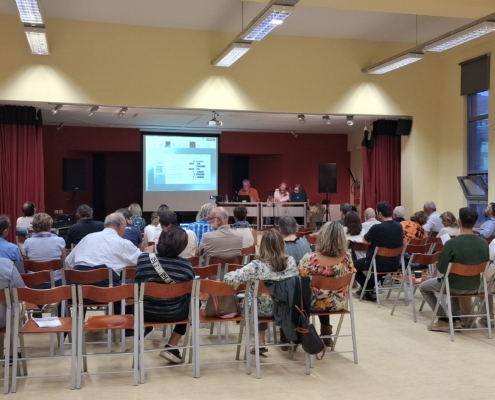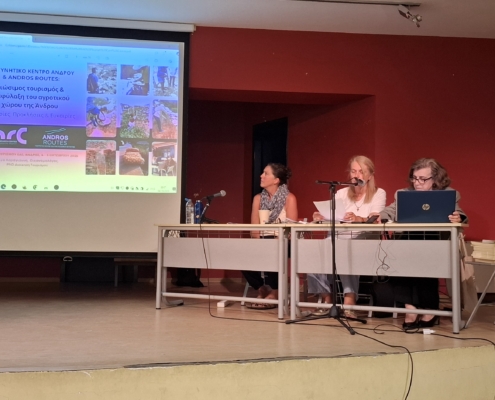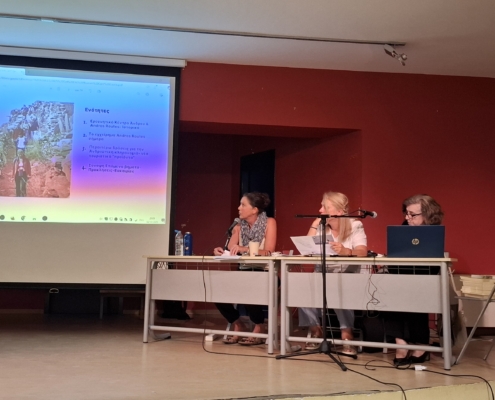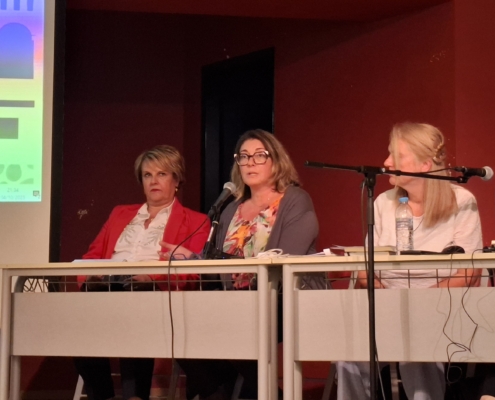Participation of the Andros Research Center & Andros Routes in the Conference “Sustainable Tourism Development in Andros”
Upon the invitation of the Society of Andriots Scientists, our organization presented its activities at the hybrid conference titled: “Sustainable Tourism Development in Andros: Reality and Prospects”, which took place on Saturday 4 and Sunday 5 October 2025 in Gavrio.
The conference included a participatory workshop and presentations by scientists, entrepreneurs, and representatives of local and national institutions.
As part of our presentation “Andros Research Center & Andros Routes: Sustainable tourism for the preservation of Andros’ rural landscape – Experiences, obstacles & opportunities”, Olga Karagianni presented the historical evolution of our organization’s work, focusing on the Andros Routes initiative, which this year celebrates 15 years of activity, along with complementary actions for the preservation of rural heritage and the support of the primary sector, carried out by our organization from the pandemic period to the present.
During the presentation, we highlighted:
-
Significant achievements, such as the establishment of Andros as a quality hiking destination through the European quality certification “Leading Quality Trails – Best of Europe” awarded to the 100 km continuous hiking trail “Andros Route.”
-
The ongoing challenge of ensuring consistent and sustainable maintenance of the hiking network, which now extends to 240 km, supported by volunteers and workers.
-
The current lack of institutional protection for the trails, illustrated by an example of a certified section at risk of encroachment.
-
The urgent need for the Municipality of Andros to take action towards the institutional safeguarding of the hiking network, in order to protect this valuable resource that is currently at risk.
More broadly, the presentation emphasized the potential for revitalizing rural areas through synergies between the primary sector and sustainable tourism, creating opportunities for economic and moral support for residents and local producers, and for authentic visitor experiences through increased visits to sites of production and processing.
In terms of our further actions for the study, promotion, and preservation of rural heritage, we presented activities carried out from 2020 to today, including:
-
An initiative on agro-food tradition and memory in three areas of Andros.
-
(2024–2025): “Cultivation & processing of the Andros lemon” – research and promotion actions supported by the Ministry of Culture.
-
(2025–2026): “The Lemon Grove of Livadia in Andros: Soundscapes of biodiversity & human stories”, supported by Cycladic Identity.
-
(2025–2027): “The Springs of Andros – Participatory Observatory of Springs and Surface Waters”, supported by the Green Fund.
-
“Earth, Stone & Water – Our Stories”, an educational action under the “Points of Support” program.
Below you can find the summary of our presentation, the valuable lessons we have learned over the past 16 years at the Andros Research Center, as well as the challenges and opportunities that lie ahead.
Some of the key points we raised:
16 years in the Andros field – What have we learned?
🔹 The rural landscape of Andros holds precious “raw materials” for the creation of tourism “products” and experiences.
The local producers and members of cultural associations are essential partners in this process — the true guardians of heritage.
🔹 The hiking network is a valuable resource for initiation, understanding, and contact with the natural and cultural heritage — both tangible and intangible — and serves as an important platform for research, education, and awareness-raising.
🔹 The management and maintenance of hiking networks require:
-
A high level of commitment
-
A stable, long-term structure for monitoring, cleaning, and maintaining trail signage
🔹 Local volunteering:
-
Expands public interest and cultivates a heritage preservation mindset
-
Functions as a guardian and caretaker of natural and cultural heritage
What do we consider critical?
🔹 The development of tourism products that align with the character of Andros and are linked to existing resources.
Tourism success and promotion stem from caring for existing assets.
🔹 The promotion of local agricultural activity and its connection with tourism and local engagement (both residents and visitors).
There can be no destination sustainability without a connection to the primary sector.
🔹 The use and transformation of research on natural resources and living traditions into creative activities for residents and visitors — involving village cultural associations and other organizations (e.g. the Environmental Education Center of Andros).
🔹 Tourism must serve the sustainability of Andros – not the other way around.
The presentation concluded with our organization’s proposal for Andros to pursue the higher-level European quality certification “Leading Quality Region – Best of Europe,” recognizing the island as a certified hiking destination.
This process will require collaboration among key sectors of the island — accommodation, catering, commerce, local government, and cultural organizations.
A round-table discussion followed.
We warmly thank the Society of Andriots Scientists for the invitation and for initiating such a substantive dialogue through the organization of this conference.








